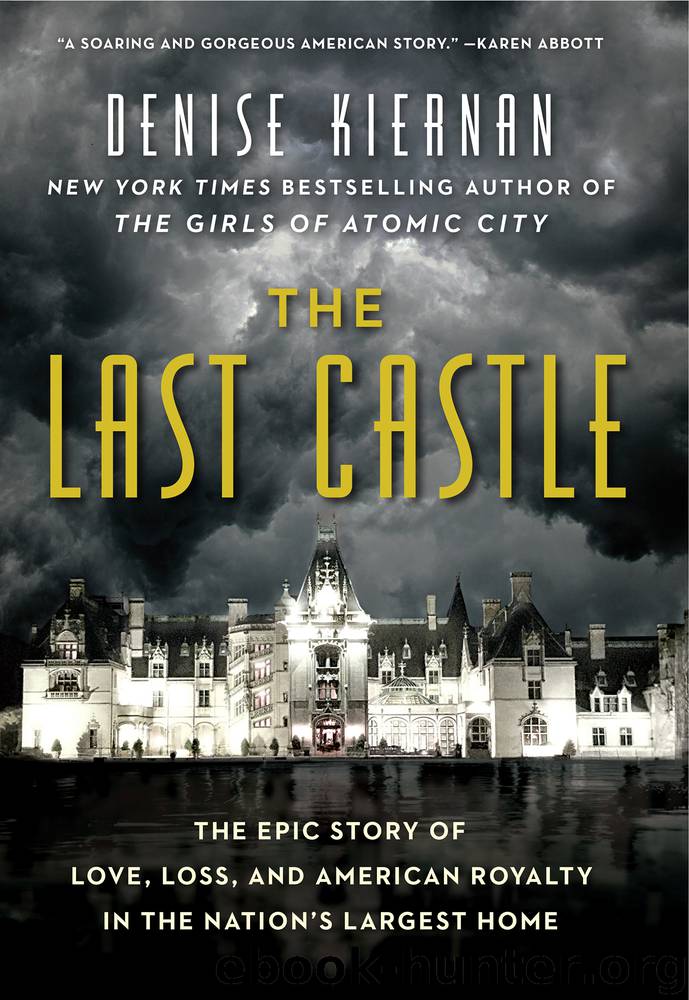The Last Castle by Denise Kiernan

Author:Denise Kiernan
Language: eng
Format: epub
Publisher: Touchstone
14
Homespun and a Great War
“Makes Children and Adults as Fat as Pigs.”
So proclaimed the small bottle’s label and its ubiquitous advertisements. The cartoon image accompanying the disturbingly enticing text featured a pig’s corpulent body topped off with the head of a grinning child, joined by a lace collar. Like some porcine centaur, this was the image that sold bottle after bottle of Grove’s Tasteless Chill Tonic. Yours for a mere 50 cents, Grove’s tonic claimed to be the “Best Cure for Malaria, Chills, Fever. On the Market over 20 Years. 11/2 Million Bottles Sold Last Year. No Cure, No Pay.” This odd piglet-child had bankrolled the creation of Asheville’s latest and most fabulous resort hotel: the Grove Park Inn.
Tennessee-born Edwin Wiley Grove was a teenager during the Civil War. In his early twenties, he took a job at the local pharmacy in Paris, Tennessee, and began to think about how he could set himself apart. Grove worked, planned, and eventually bought his employer’s small business, renaming it Grove’s Pharmacy. His imagination was fixed on what he thought would be his financial salvation: tasteless quinine.
This was an era of curious remedies for aggravating ills and their symptoms. Tar Heel Cough Syrup. Electric Bitters. Shiloh’s Vitalizer. Acker’s Blood Elixir. Magnetic Nervine. There were also the ever-present offerings of the Lydia E. Pinkham Medicine Company, with its patent-protected Pinkham’s Vegetable Compound, which claimed to offer relief from menstrual cramps, menopause, and depression. Pinkham’s single-handedly brought attention to conditions affecting women, which were roundly ignored by the male-dominated medical profession.
Noted for its antimalarial properties, quinine was a bitter—if somewhat effective—powder to swallow. It helped with fever; it reduced chills. It was no cure-all, but it alleviated some symptoms. Grove set to work on a formula that would make the popular treatment more palatable. The first of these he named Feberlin, which required a prescription for purchase. He kept at it, choosing to add sugar, lemon, and the all-purpose medicinal additive, alcohol. And so Grove’s Tasteless Chill Tonic was born. It required no prescription, and transformed Grove from struggling small businessman into malarial magnate. Near the turn of the century, sales of Grove’s bottles of Tasteless Chill Tonic were greater than those of Coca-Cola.
Grove formed the Paris Medicine Company and relocated to St. Louis, Missouri. His product list expanded to include Grove’s Laxative Bromo Quinine, touted as a treatment for the common cold. When he needed manufacturers for his new tablets he approached Parke, Davis in Detroit. The business grew, as did Grove’s bank account. Whenever exhaustion occasionally set in, Grove’s doctors—like so many other physicians—recommended a stay in a small mountain town in the Blue Ridge Mountains. He packed up some Chill Tonic—which Grove would later advertise as a restorative for “energy and vitality by creating new, healthy blood”—and headed for the breathing porches of Asheville.
During one such trip, Grove invited a young Parke, Davis employee, Fred Seely, to join him. There, Seely promptly fell in love with Grove’s daughter, Evelyn. Seely left Parke, Davis for good and went to work for the Paris Medicine Company and the father of his bride-to-be.
Download
This site does not store any files on its server. We only index and link to content provided by other sites. Please contact the content providers to delete copyright contents if any and email us, we'll remove relevant links or contents immediately.
Kathy Andrews Collection by Kathy Andrews(10575)
The remains of the day by Kazuo Ishiguro(7590)
Spare by Prince Harry The Duke of Sussex(4240)
Paper Towns by Green John(4186)
The Body: A Guide for Occupants by Bill Bryson(3847)
Be in a Treehouse by Pete Nelson(3244)
Harry Potter and the Goblet Of Fire by J.K. Rowling(3111)
Goodbye Paradise(2991)
Never by Ken Follett(2925)
Into Thin Air by Jon Krakauer(2721)
The Remains of the Day by Kazuo Ishiguro(2633)
The Genius of Japanese Carpentry by Azby Brown(2622)
The Cellar by Natasha Preston(2614)
Drawing Shortcuts: Developing Quick Drawing Skills Using Today's Technology by Leggitt Jim(2540)
120 Days of Sodom by Marquis de Sade(2454)
Architecture 101 by Nicole Bridge(2360)
Machine Learning at Scale with H2O by Gregory Keys | David Whiting(2338)
The Man Who Died Twice by Richard Osman(2319)
Industrial Automation from Scratch: A hands-on guide to using sensors, actuators, PLCs, HMIs, and SCADA to automate industrial processes by Olushola Akande(2205)
